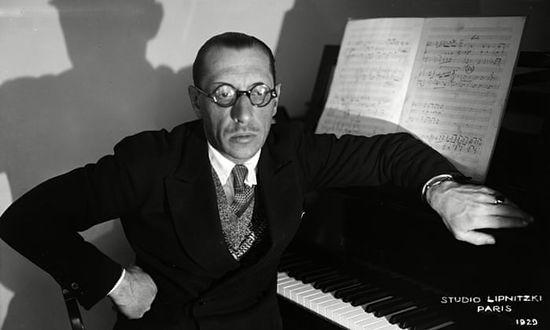Igor Stravinsky
Igor Stravinsky (June 17, 1882, Oranienbaum, Russia - April 6, 1971, New York, NY) was a Russian composer, who is regarded as the most important and influential composer of the 20th century. Stravinsky is famous for his ballets, The Firebird (1910), Petrushka (1911) and The Rite Of Spring (1913). The works are noted for their innovative rhythms, composition techniques and brutal and noisy deconstruction of traditional Western harmony. "The Rite Of Spring" made Stravinsky world famous and notorious because the audience started to riot during the premiere of the piece. [1]
Throughout his career Stravinsky proved to be original and versatile, reinventing traditional classical music in his neoclassicism works and also later as a composer of serialism.
Contents
Zappa and Stravinsky
Together with Edgard Varèse Stravinsky was a major influence on Zappa's music. He is included in the list of influences in the sleeve of "Freak Out!". He is also mentioned in "The Real Frank Zappa Book" (1989).
Stravinsky quotes in Zappa's music
- The Return Of The Son Of Monster Magnet has a segment referred to in the liner notes as “Ritual Dance of the Child-Killer”, a tribute to Igor Stravinsky's “Ritual Dance” movement from The Rite Of Spring.
- Amnesia Vivace musically quotes "The Rite Of Spring" and "The Firebird".
- Invocation & Ritual Dance Of The Young Pumpkin musically quotes "The Rite Of Spring".
- Soft-Sell Conclusion quotes the Royal March from L'Histoire Du Soldat, after Zappa says: "The pumpkin is breathing hard".
- Status Back Baby quotes "Petrouchka".
- Zappa said in an interview that his decision to parody 1950s doo-wop and rock 'n roll on Cruising With Ruben & The Jets was inspired by Stravinsky's neoclassic works which parodied 17th and 18th century classical music: "It wasn't really a parody. If you are familiar with the development of the music of Igor Stravinsky; at one point he started writing a whole series of compositions that were in a style grossly unpopular at the time.He styled his own ideas in the old-style classicism; the rigid and certain type of harmony and certain type of scale structure. Basically that was what was happening with Ruben and the Jets. It was a neo-classic album. It uses all the structural elements of those type of songs. And it adhered to that form, except it was a modern-day thing, a modern day production." (FZ in Mother In Lore)
- Fountain Of Love quotes the introductory notes of The Rite Of Spring.
- Titties 'n Beer tells how a Devil tries to make a deal with a biker. In Stravinsky's "L' Histoire Du Soldat" the Devil tries to make a deal with a soldier. At one point the Devil in "Titties & Beer" namedrops Stravinsky when Zappa makes him guess what his two main interests are.
- In-A-Gadda-Stravinsky quotes In-A-Gadda-Da-Vida by Iron Butterfly and The Rite Of Spring.
- Zappa covered the Royal March from L'Histoire Du Soldat on Make A Jazz Noise Here.
- The Mothers often included a brief extract from "Petroushka" such as can be heard on 'Tis The Season To Be Jelly.
Zappa about Stravinsky
- Zappa played Stravinsky's "Greeting Prelude" as a guest on Dr. Demento (December 1973).
- Zappa played the Royal March from "L'Histoire Du Soldat" as a guest in Musik Für Junge Leute (16 September, 1974).
- He played the "Berceuse" from The Firebird and the Royal March from "L'Histoire Du Soldat" on WSTM, Chicago (21 November 1974).
- Two extracts from "The Rite Of Spring" are played in Frank Zappa's Jukebox.
- In 1972 Zappa performed the narration for "L'Histoire Du Soldat" for a conducted by Lukas Foss at the Hollywood Bowl.
- Stravinsky is mentioned in "My Favorite Records", a FZ penned article in Hit Parader (1967): "Also, buy everything that you can by Igor Stravinsky and dance to it - especially "L'Histoire Du Soldat", which means "Soldier's Tale", and the "Agon" ballet, which is a beautiful thing."
- "The Royal March" from "L'Histoire Du Soldat" was mentioned during "Star Special", FZ as a guest DJ on BBC Radio 1 in 1980.
- "The Royal March From L'Histoire Du Soldat and The Rite Of Spring were two of the ten records Zappa selected (in 1989) for the American radio show Castaway's Choice.
